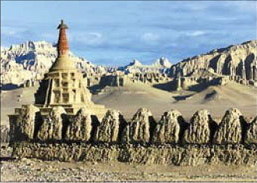Documentaries zoom in on China as Olympics nears
Updated: 2007-11-29 07:42
SINGAPORE: Guge, the long-lost kingdom which ruled the western part of Tibet after the 10th century, collapsed suddenly about 300 years ago when the introduction of Christianity is believed to have created a rift in the royal family.
|
|
But its hardly accessible ruins will soon come to life in a documentary series to be made by a Singaporean-Chinese collaboration in time for the 2008 Olympics.
The production of the series comes amid global enthusiasm for producing documentaries about China.
Some of the world's biggest broadcasters and producers are making, or preparing to make, documentaries to coincide with the Games, they told China Daily on the sidelines of the ongoing Asia Media Festival in Singapore.
Most cover history, archaeological findings and scientific development as well as the lives of ordinary people.
Besides the one about the Guge kingdom, a documentary about the expectations of Chinese children for the Olympics as well as four others are going to be produced by the Media Development Authority (MDA) of Singapore in conjunction with China's State Administration of Radio, Film and Television, said MDA Chief Executive Christopher Chia.
An Australian vet who works on the Qinghai-Tibet Plateau treating farmers' oxen and sheep will be the star in a documentary series to be launched next year by LIC Australia - one of the largest television program broadcasters and distributors in the country - and Singaporean producer Upside Down Concepts, according to a memorandum signed by the two companies.
The high-speed railway system being built around China is the focus of interest for Craig Thompson, executive producer of Ballinran Productions in Canada. He is preparing to make a documentary about the Chinese scientists behind the project.
Children's education in China as well as other parts of Asia make a perfect topic for Mika Kanaya, producer at Japan's NHK.
Courtney Thompson, a senior manager at National Geographic Channels International, is most interested in documentaries about China's archaeological findings and rich history.
Besides, contemporary people's lives and cultural events in China and other parts of Asia are the subject for Michelle Schofield, director of AETN All Asia Networks, a newly established branch of the American television networks AETN with its headquarters in Singapore and operations in Kuala Lumpur.
Broadcasters and producers agree that the international market for documentaries about China is "huge" before the Olympics.
But most, including those broadcast in Asia, are made by Westerners.
In Asia, the market value for documentaries and programs such as cooking and travel, amounts to $600 million a year, but only about 30 percent of the programs are made by Asian producers, said Tony Chow, president of the Association of Independent Production Companies in Singapore.
The international market wants documentaries by Asians, including Chinese, but they need a global touch to be successful.
"I hate to say this, but if a documentary is meant for the American market, it has to include someone like a Harvard professor so that the audience can get a feeling of relativity," said Schofield at AETN.
|
|
|
||
|
||
|
|
|
|
